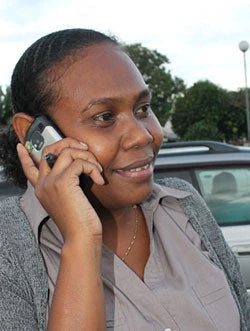 54 in every 100 Solomon Islander now
54 in every 100 Solomon Islander nowhas access to some form of modern
telecommunication.
Recently my 10 year old son invited me to be friends with him on Facebook. “Hi mum I’m here too, can we be friends?” was the message I got. I was shocked and worried at the same time, and my initial reaction was fear of the perceived harm social media could do to a person as young as he.
We finally agreed that his father would have access to his Facebook account to monitor his online activities until he reaches 18. But the moment he gets or posts something inappropriate, the deal is off. That’s a fair deal, I told myself and interacting through social media could actually enrich my son’s life.
What I’m going through is also experienced by other families in the Solomon Islands. It started when mobile phone technology began revolutionizing the lives of ordinary Solomon Islanders in the last five years, when the telecommunications industry was opened for competition. Previously, only business executives and senior government officials owned or had access to mobile phones – a luxury only the rich and the influential would enjoy.
Although mobile phone technology was available in Solomon Islands since the late 1990s, due to the then monopolistic structure of the industry, it was excessively expensive and was only accessible to a mere 11 percent of the population (65,000 people).
Since the World Bank supported the Solomon Islands Telecommunications and ICT Development Project in 2010, access to mobile phones and internet continues to improve. The cost to make phone calls has now dropped by 60 percent. The price of a mobile 3 minute local call in 2010 was $1.20. Now, the average price is less than $0.50. Although the cost of internet is prohibitive, greater internet competition is pending, in light of the government’s upcoming investment with the private sector in a new submarine fiber-optic cable.
The fact remains that 54 in every 100 Solomon Islander now has access to some form of modern telecommunication, which is good for a population of just over half a million people, spread across 1.34 million square kilometers of ocean. Families are able to stay in touch, and in times of catastrophic natural disasters, mobile communications can save lives.
Mobile competition has also opened up new business opportunities. Solomon Telekom Limited, one of the only two mobile service providers, reported that since 2010 when competition was introduced, over 8,000 individuals and businesses have signed up as a Telekom Me Top-Up agent to sell mobile credit. The rate of return is more than 10 percent, and the majority of people signing up for it are women.
Thelma Nieng, an employee with the local broadcasting corporation, has been operating a Me-Top-Up service since 2010. “It’s a good business. They say the profit you get for selling whatever worth of credit that you buy is 10 percent, but in fact you get more than that,” she told me. She now sells credits to people in the provinces, who then sell it to other people at the same rate of return. She recommends it to women who are looking for a less complicated way of making an income.
Better internet connection has also helped Solomon Islanders to keep in touch with families abroad. Like Anna, who left her 7-month old baby with her parents in a village in Malaita to do her Master’s degree in Australia. She is able to concentrate on her studies only because she keeps in touch with the family through mobile communications. Finding out the state of her baby everyday makes a big difference, according to Anna.
In all, I feel glad with the way mobile phones and internet has affected my life and the people in my country.
Have you recently been “connected” too? I’d like to know how it has also affected you.


Join the Conversation